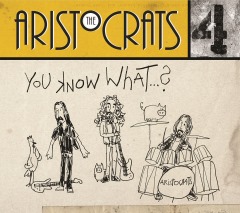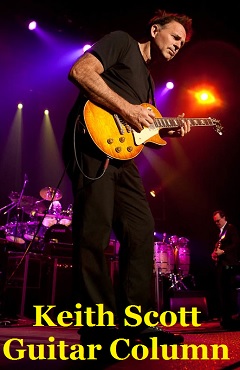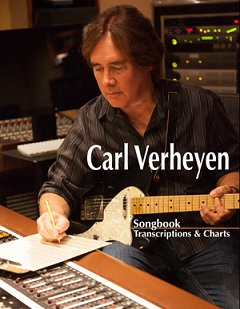Guthrie Govan

Photo by Morgan Brown Photo
The Aristocrats consists of Gathrie Guthrie Govan [guitar] ,Bryan Beller [bass] and Marco Minnemann [drums]. The band is a union of technically advanced players who deeply understand different type of music from Jazz to Fusion to Progressive Rock to Country to Blues to anything beyond, and can merge them together into the original Aristocrats style. Their newly released 4th original album “You Know What…?” displays rich sound elements from each member and their musical expressions based on technics pull listeners into the magical world of Aristocrats. The crucial album could be listened from the beginning to the end in one go like a roller coaster. We had a chat with the one of the most technical guitarist, Guthrie Govan who is respected by not only music fans who are into Guitar instrumental music or Rock or Fusion and other top guitarists about the new set “You Know What…?”
Interview / Text Mamoru Moriyama
Translation Hiroshi Takakura

Photo by Morgan Brown Photo
Muse On Muse : The wonderful new album from THE ARISTOCRATS consists of elements of different genre of music, but it all merged together into your original style and well worth a listen. What is the meaning behind the album title “YOU KNOW WHAT…?”
Guthrie Govan : That phrase originates from an “in joke” between all three members of the Aristocrats. Some aspects of it are impossible to explain to anyone outside the band – actually, this is very frequently the case with “tour humour”! – but we specifically chose that phrase as the title of our new album to express a kind of joyful defiance, in the sense of: “You know what…? We’re going to make whatever kind of music we like on this album, and not care about what anyone else expects us to do!” We enjoy the feeling of being in a trio where we can enjoy so much creative freedom, so the title basically celebrates that…
MM : This is the 4th studio album of The Aristocrats. What was your goal for making this album?
GG : Really, we just wanted to make another album: we’ve always liked the idea of the Aristocrats being a “long-term” kind of band who could play together for many years and make many albums, rather than just being a “project”: after having taken a break for a year or two, we all felt that it was definitely the right time to go back into the studio. As always, we were hoping we would be able to produce something which would be superior to our previous recordings… or, at the very least, something which would be different. We try to surprise each other when we write music for this band, rather than defining a strict musical formula and then simply repeating it on each new recording.
MM : According to the booklet of the CD, each of you, Marco and Bryan wrote 3 tracks for this album. What is the level of completeness of demo songs which are given to other band members?
GG : Our demos are really quite detailed: they generally provide quite a specific indication of how we’re imagining the parts and sounds for each instrument. (We actually included some demo versions on the Deluxe Edition of the album, so that our more curious listeners would be able to compare those with the final versions and hear how the songs evolved…)
MM : And how is the production process after the demo? When members bring their part, what happens next? How you guys finish songwriting? Please tell us the detail of the process.
GG : Before we enter the studio, we listen to all the demos and learn the parts and structure for each song. Then, when we meet up in the studio, we just start playing the songs together as a band and work on details like dynamics, getting the ideal tones, deciding which sections to extend… and so on. Then, we’ll normally record a live take as a band and go on to replace or overdub anything else which we would like to hear in the track. We always like to start out by recording live, in “real time”, to provide a solid foundation… but then the song can sometimes transform quite dramatically if we choose to dive deeper into the process of overdubbing and layering! (This was particularly true for Marco’s contributions on this album…)
MM : The powerful guitar plays of the opening track “D Grade Fuck Movie Jam” is enormously and it reminds me Jimi Hendrix.
GG : That’s one of Bryan’s songs. The title is actually quote from something which a reviewer wrote about us about six years ago: it was obviously quite a negative, unflattering review but we didn’t really care: we just thought the phrase “D Grade Fuck Movie Jam” sounded amusing. So… as a response, Bryan was inspired to imagine how it might sound if the Aristocrats wrote some music for a low-quality 1970s porno movie… with deliberately excessive amounts of wah-wah guitar and cowbell! As I recall, Bryan’s main reference point for the guitar tone was originally Mike Landau but I suppose there are definite elements of Landau’s style which can be traced right back to Hendrix and I was indeed thinking of a “hot-rodded” interpretation of Jimi’s style when I tracked that song – particularly in the solo section, where we used an old Univibe pedal!
MM : The song title “Spanish Eddie” sounds little bit suggestive.
GG:There’s really nothing suggestive in there at all: I just thought that some of the song sounded unusually Spanish in style, so I named it after a line in a song called “Blackjack” by the band Ween… it’s quite a strange song but it does contain the line “Spanish Eddie”. I suppose that song is a strange blend of progressive elements and Spanish elements: I was actually quite pleased with it, compositionally, as it incorporates a lot of drastically different moods and styles (from mellow jazz to flamenco to aggressive prog-metal) but I like to think everything flows together in a way which makes artistic sense…
MM : Footsteps and the cry of the giant dinosaur came into my mind when I listened guitar and other sounds on “Terrible Lizard”.
GG : That’s exactly what I was hoping to evoke: thank you for understanding the intention of the song so precisely! Basically, I’ve just been fascinated by dinosaurs ever since I was very young (doesn’t every child like dinosaurs?!) and I’ve always wanted to write a song about one. Well – now I’ve finally done it! It was an interesting change for me to try writing something with such a heavy tone and such a slow tempo… it was a fun process!
MM : Clean guitar sounds, codes and beautiful phrases on “Last Orders” are very impressive and it fits the last part of the album.
GG : At first, I wasn’t sure if that song would fit very well within the context of the Aristocrats – it’s very slow, melancholic and “serious”, which is not at all the way people would normally think of our band! Nonetheless, the main melody was stuck in my head all the way through my writing sessions for this album and it simply refused to go away: eventually, I realized that I really needed to transform it into a finished song. Once I had done so, I thought: “You Know What…? Why shouldn’t the Aristocrats play a song like this?” I think willingness to try new things like that is one of the ways we can ensure that our band will continue to grow and evolve…
MM : Please tell us about gears. What guitars, amps and pedals did you use for this project?
GG : My main rig for the bulk of the album was an ash-bodied GG signature Charvel guitar and a Victory V30 Mk2 head (running through a 2×12 cabinet fitted with Celestion Vintage 30 speakers.) I did experiment with some other equipment, though – mainly because the studio where we recorded had an extensive range of gear for us to try out. “Spiritus Cactus” was all played on a 60s Jazzmaster, “The Ballad of Bonnie And Clyde” was recorded with a 70s Les Paul and “When We All Come Together” features a wide selection of unusual instruments – I used a BilT Corvaire, a Duesenberg baritone and mandola, a “junk shop” arch top acoustic (with no visible brand name), a Deering banjo… and probably some other things, too! Amp-wise, I used a Vox AC30 for the clean tones in “Spanish Eddie” and “Last Orders”, whilst “All Said And Done” was recorded with a small Carr combo (I don’t remember the model name, alas) to evoke a more “vintage” vibe. I probably used fewer effects on this album that I did on the previous one. I used an Xotic wah for things like “D Grade…” and the jam section in “Terrible Lizard”: you’ll also hear a Providence Anadime Chorus on “Last Orders”. I borrowed an old Univibe for the solo section of “D-Grade…” and some of the strange textures on “Burial At Sea” were created with an Eventide H9 (using its Synthesizer algorithm…) Oh, and I made subtle use of an Xotic EP Booster here and there… mainly on “Terrible Lizard”.

Photo by Morgan Brown Photo
MM : Sometimes it is a bit difficult or too hard to listen as a whole album which are done by extremely technical guitarists. But your albums do not only display your intense guitar skills, but also deliver rich musical feelings so it sounds very pleasant through whole albums. What do you reckon about this?
GG : Well… I don’t think that what I played on this album was particularly “technical” – I could certainly have made the guitar parts more technically complex and demanding if that had been my goal. My main priority truly was to focus on trying to be musically meaningful and to use the guitar to bring the right kind of mood or “colour” to each song. I’m very happy that you could recognize this intention when you listened to the album!
MM : You had transcribed and interpreted the work of the guitar legends and their songs in lessons on Guitar Techniques magazine. Your imitation performances were very close to original. But you have built your original Guthrie Govan style as well. How did you end up your unique guitar style rather than just copying other star guitarists?
GG : I always like to think of music as a language, and I learned music in the same way that I learned to speak English: I’m a self-taught player who started very young so, at first, all I could do was to copy everything I heard around me: you need to do that in order to “learn the language” and develop a vocabulary. Once you’ve built up your vocabulary, you can then start to focus on using the language of music to communicate whatever it is that you actually want to say – and that’s where a musician’s unique voice and identity comes from. Way back when I first started to do all that transcription work for Guitar Techniques magazine, I had already written and recorded versions of original songs like “Waves”, “Wonderful Slippery Thing” and “Bad Asteroid” so I think I’ve always had quite a clear idea about the way I want to sound as a musician. I just discovered that the way I learned when I was younger, with all that emphasis on learning by ear, had given me a certain ability to transcribe and emulate what other players were doing… so it made sense for me to look for a job where I could use those skills both to make a living and to help other players!
MM : You deeply understand about Rock, Jazz, Fusion, Country, Blues and other different type of music and have advanced techniques to play guitars based on any of those genres. How did you adopt different styles?
GG : To me, they’re all connected. I feel like all the musical styles/genres are like different regional dialects of the same basic language, rather than being totally unrelated. I genuinely like to listen to all of those styles so… why not learn how to play them all? That approach always felt entirely normal and logical to me… my natural musical personality doesn’t seem suited to choosing just one area of music and only specializing in that.
MM : You have been releasing magnificent instrumental project these days. Don’t you have any plan to form a Rock band with a vocalist like when you did ASIA or GPS?
GG : Not really. I’m generally happiest when I’m writing instrumental music – that’s mostly what I’ve been doing since I was a young kid! – and I enjoy the fact that instrumental music can be played anywhere in the world without the “language barrier” becoming a problem.
MM : Please tell us your upcoming plans.
GG : I’ve just finished a 10-week tour of the US with the Aristocrats… and right now I’m about to start rehearsals with Hans Zimmer, for a shorter tour of Asia and Australia with his band and orchestra. After that, the Aristocrats will regroup to start touring in Europe. To summarize: there will be a huge amount of gigging and traveling for the next half a year! After that, I really don’t know what I’ll do next: perhaps I should take a little rest and then decide?
MM : Please leave a message to your fans.
GG : All I can really say is: thanks so much for listening and for being interested in what I do! I hope to see some of you out there on the road at some point soon!
Guthrie Govan facebook : https://www.facebook.com/GuthrieGovanOfficial/
The Aristocrats official site : http://the-aristocrats-band.com/

The Aristocrats / You Know What…?
1.D Grade Fuck Movie Jam
2.Spanish Eddie
3.When We All Come Together
4.All Said and Done
5.Terrible Lizard
6.Spiritus Cactus
7.The Ballad of Bonnie and Clyde
8.Burial at Sea
9.Last Orders

